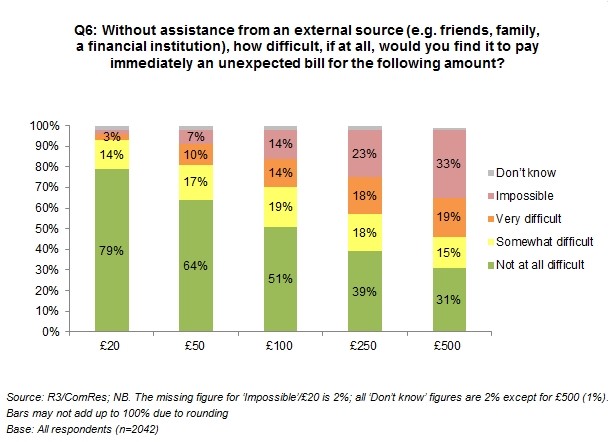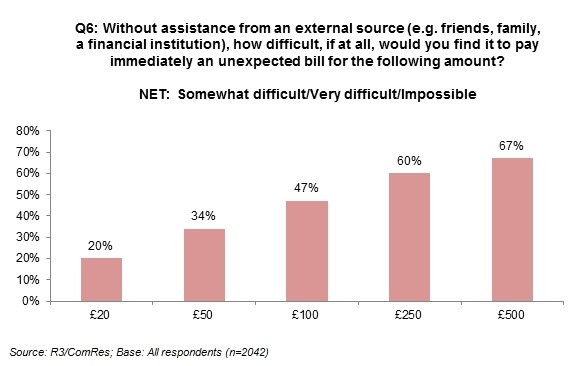
Unexpected bill of just £20 would prove difficult or impossible to pay immediately for 1 in 5 British adults
22 December 2018
One in five British adults (20%) would find it somewhat difficult, very difficult or impossible to immediately pay an unexpected bill for an amount as little as £20, without assistance from an external source, according to new research from R3, the insolvency trade body, and ComRes.
Around 1 in 20 (6%) of British adults said they would find it 'very difficult' or 'impossible' to immediately pay an unexpected £20 bill, while another 14% said that doing so would be 'somewhat difficult'.
R3's research asked British adults how difficult they would find it to immediately pay unexpected bills for other amounts too. A third (34%) said they would find it at least somewhat difficult to pay an unexpected £50 bill, 47% said the same about a £100 bill, 60% said the same about a £250 bill, while 67% said this would be the case for a £500 bill. Half (52%) of British adults would find it very difficult or impossible to immediately pay an unexpected £500 bill.
The research highlights the lack of financial resilience among British adults, and demonstrates the toll taken by years of non-existent real wage growth on levels of savings.
Stuart Frith, President of R3, said: "The research is more evidence of financial precariousness in Britain, and a worrying sign that many people do not have any kind of financial cushion to fall back on if needed."
"Many people are one unexpected bill away from losing financial stability. A missed payment for a relatively small amount can be the trigger for an escalation in debt that soon becomes impossible to juggle."
Stuart Frith continues: "Unexpected bills for these amounts aren't uncommon: £20 for a school uniform, £50 for a train ticket to visit a sick relative, £100 for a new washing machine motor, £250 for car servicing or repair, or £500 for a boiler repair or replacement.
"When bills like these become too much, people in debt might discover another unexpected and unaffordable bill: it costs £680 in government fees to enter bankruptcy. This kind of artificial barrier to an insolvency procedure makes it harder for people to resolve their debts and rehabilitate themselves financially. The Government must look at how to make bankruptcy more accessible."
The Government has announced some steps to support those in financial trouble, including a new 'breathing space' procedure, and a 'Help to Save' scheme.
Stuart Frith adds: "R3 has long advocated for a breathing space period, free from creditor action, during which people in debt will have the opportunity to speak to a regulated adviser about their options. At the moment, we are concerned that people in financial distress do not have access to pressure-free advice, which makes it harder for people to find the most appropriate solution for their situation.
"Help to Save is a potentially useful tool as well. The ONS says that, in 2017, UK households spent £900 more than they received in income, so alarm bells should be ringing at the highest levels about financial vulnerability to external shocks."


Housing, age and gender
Looking at the research more closely, some clear differences emerge among certain demographics.
Home ownership appears to be a key factor: half (51%) of renters would find it very difficult or impossible to pay immediately an unexpected bill of £100 without assistance from an external source, over three times the proportion of homeowners (16%) who said the same thing.
Women (32%) were significantly more likely than men (23%) to say it would be very difficult or impossible for them to immediately pay an unexpected bill of £100 without external assistance. This was also the case when asked about bills for any other amounts tested: £20 (7% women vs. 4% men); £50 (19% vs. 13%); £250 (47% vs. 36%), and £500 (60% vs. 45%).
Those aged 35-54 were most likely to say they would struggle to immediately pay an unexpected bill for £100 without external assistance, with nearly two in five (38%) saying it would be very difficult or impossible for them, followed by those aged 18-34 (33%). In comparison, just 15% of people aged 55+ said the same.
Stuart Frith commented:
"The differences between homeowners and renters, men and women, and those in varied age brackets show that the picture is far from homogenous. Sadly but unsurprisingly, people in more financially insecure situations are the most at risk of having their situations deteriorate due to a single unexpected bill.
"Although it has slowed recently, the rate of growth of consumer credit has continued to rise, and the consumer debt burden is approaching levels last seen just before the global financial crisis. Borrowers who are just skating by may be caught out by future interest rate rises, making the cost of servicing their debt just that little bit too high - our research shows that a small but significant number of people would be hard-pressed to find even an extra £20.
"With consumer spending underpinning much of the UK's economy, and with consumer confidence strongly linked to levels of disposable income, the economic impact of low levels of savings and people's vulnerability to financial shocks could be severe."
- ComRes interviewed 2,042 British adults online between 17-18 October 2018. Data were weighted to be demographically representative of all British adults by age, gender and region. ComRes is a member of the British Polling Council and abides by its rules. Full data tables are available at www.comresglobal.com.

- R3 Blog Member news, commentary and analysis from R3
- Policy & Research Insights into the economy and the insolvency and restructuring, and recommendations for reform
- Consultation Responses Our responses to Government consultations on insolvency and restructuring issues
R3 members can provide advice on a range of business and personal finance issues. To find an R3 member who can help you, click below.

 Stuart McBride
Stuart McBride Amelia Franklin
Amelia Franklin Lyle Horne
Lyle Horne
